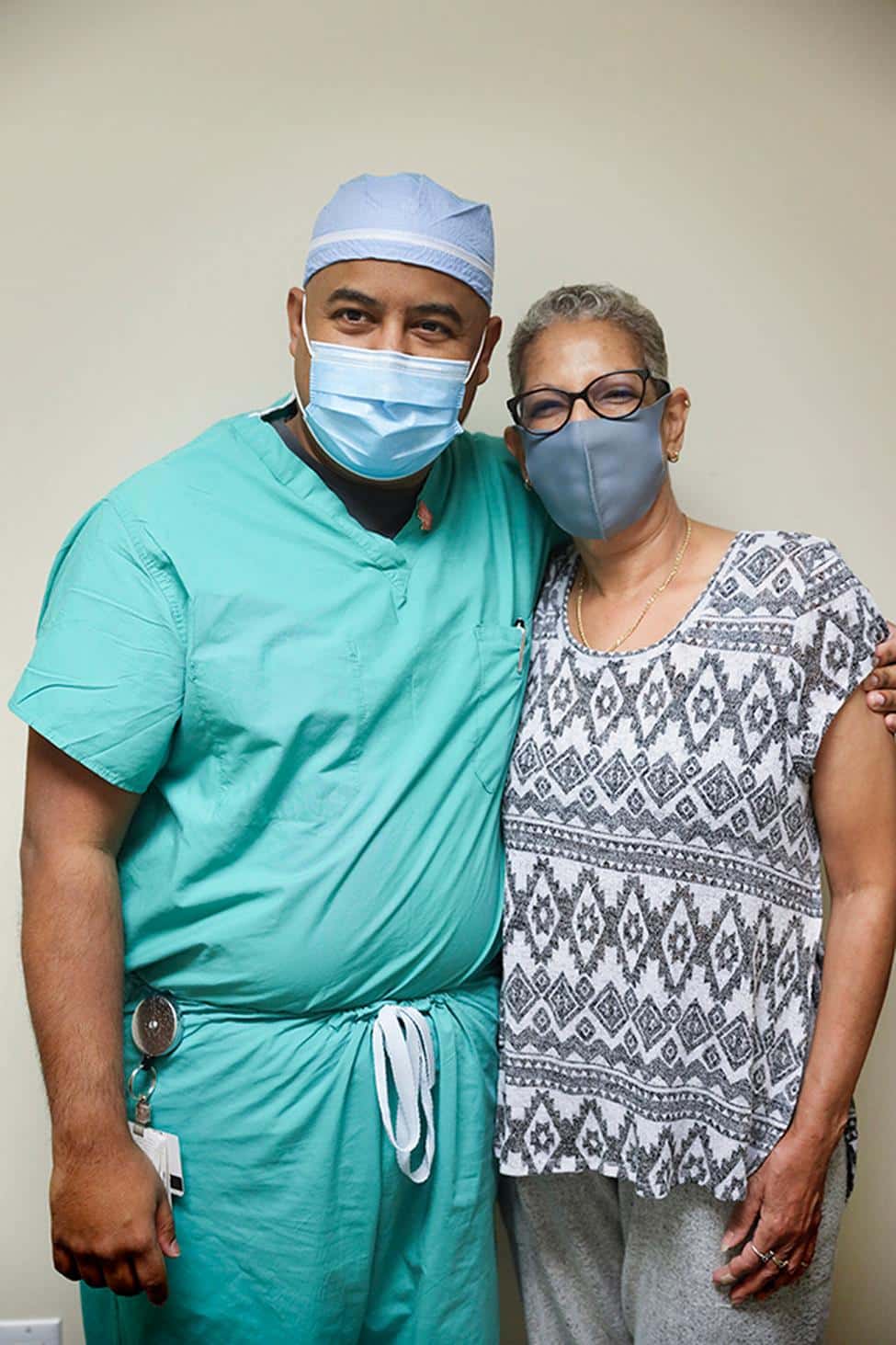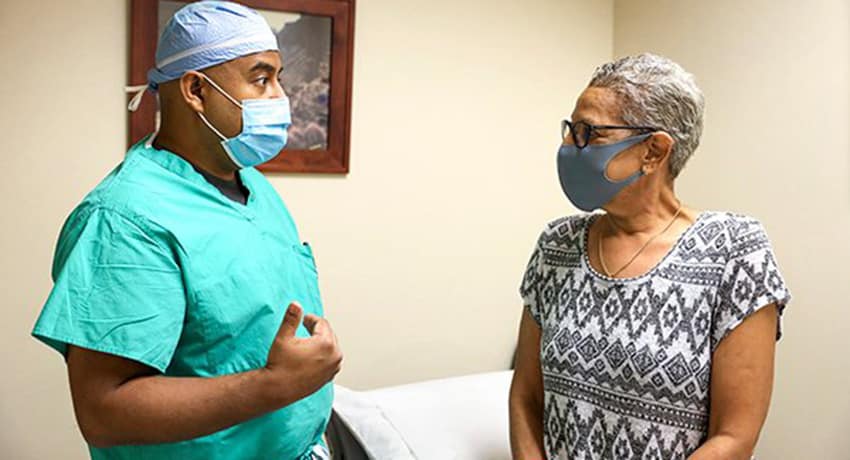Doralyn Davenport, a 54-year-old woman from Crosby, knew something wasn’t right when she started to have stomach pains, difficulty going to the bathroom, and bleeding. She was shocked when a colorectal screening colonoscopy revealed a more than 6-centimeter tumor in her gastrointestinal tract, and was worried how undergoing chemotherapy and radiation might impact her chronic obstructive pulmonary disease (COPD), an inflammatory lung disease that causes obstructed airflow from the lungs.
Thankfully, Bidhan Das, MD, a colorectal surgeon with The University of Texas Health Science Center at Houston (UTHealth), worked in tandem with a multidisciplinary medical team to devise a surgery-first plan for removal. This unique plan spared her from having to endure chemotherapy and radiation prior to surgery, which is the typical protocol for rectal cancer in the U.S.
“I call my medical team my angels from heaven,” Davenport said through tears. “When you first get diagnosed, you don’t know if you want to scream or cry. It’s just a jumble of emotions. You get a really long name placed on you with the word ‘cancer’ behind it – it does something to you. But God sent me angels!”
“We tailored a very specific plan for this complex case, and are thrilled with the results,” said Das, an assistant professor of surgery with McGovern Medical School at UTHealth who sees patients at UT Physicians, the school’s clinical practice. “We strive for patient-centered cancer care at UT Physicians, and this case proves this type of precision medicine is critical. Not only is Doralyn now cancer-free, but her COPD has improved. We couldn’t have asked for a better outcome.”
Das said unlike with colon cancer, chemotherapy and radiation are often the first round of treatment patients with rectal cancer receive to reduce the size of the tumor.
“Many physicians hope that the tumor will respond to those treatments without having to do surgery, and the limited data we have seem to indicate that this could happen in about 1 in 5 patients. But there are many cases where the patient could benefit from a surgery-first approach, like they are doing more often in England. The recovery from surgery using new enhanced recovery techniques is much better – Doralyn was discharge-ready the next day after her surgery, which is unheard of for someone with such a large tumor,” Das said.
Davenport was released on Friday, Feb. 12, only to face the winter storm that knocked out power for more than 3 million Texans beginning Monday, Feb. 15. She was without power for about 32 hours.

“I not only survived my surgery, but then I survived post-operation recovery in the freezing cold. My stitches were sore but thankfully, when I got home I was able to do small things around the house to take care of myself pretty much immediately,” she said.
And now, Davenport said she feels more alive, and is grateful she has been able to decrease her oxygen use for COPD.
“I never realized how much the cancer was sucking the life out of me. It was messing with my lungs as well – after the surgery my lungs are much better than they were. Before the tumor removal, I couldn’t eat right and I was always uncomfortable. It feel like my diaphragm was pushing up on my lungs, making it hard for me to catch a breath. And even as I’m sore and healing, I have a different level of energy. I used to be constantly tired and I thought it was my lungs, but it was also the cancer feeding.”
Das said the fatigue and the decrease in appetite were likely the work of the hormones produced by the tumor.
“Tumors produce hormones that cause you to eat less because the tumor is stealing nutrients from the host to be able to grow,” said Das. “In this case, it was likely the inflammatory hormone ‘tumor necrosis factor alpha’ interfering with Doralyn’s energy and appetite, especially because the tumor was so large.”
Das said Davenport was fortunate to have warning signs like pain and bleeding, because colorectal cancer does not always show symptoms.
“People don’t realize you can’t feel colorectal cancer growing because the colon and rectum don’t have those sensations. These are often silent tumors that can be exceptionally deadly – that’s why keeping up with your screenings is so important,” Das said.
In the last year, the American Cancer Society recommended that screening for colorectal cancer should start at age 45 for all average-risk individuals, regardless of age. For the last several years, the American College of Gastroenterology has recommended screening for average-risk people at age 50 and Black people at age 45.
The rate of mortality for colorectal cancer has decreased since the early 2000s; however, the mortality rate of African Americans is still 35% higher than that of whites, Das said.
“Increased endoscopic screening in African Americans has contributed to the decrease in mortality, but there’s more to be done to continue to drive these numbers down,” Das said. “Listen to your body and make sure you are getting things checked, especially if you start to notice symptoms.”
Symptoms of colon cancer include:
- Rectal bleeding
- Blood in stool making it dark
- Abdominal pain or cramps
- Incomplete feel of going to the bathroom
Davenport said now she urges everyone she knows to get screened as early as possible.
“I’m biracial, and I know that often times African Americans and minorities hesitate to take care of things like this. But it doesn’t matter who you are – don’t put it off! Let my story help you – there’s too many that die. To have my cancer caught the way that it was, and have it removed, is a miracle to me. People keep telling me I look better and more alive. Last year, 2020, wasn’t pleasant, but because of my medical team, it turned out great for me. I’m ready for 2021 to be even better.”
To be screened or make an appointment with the UT Physicians colorectal team, call 888-4UT-DOCS.


